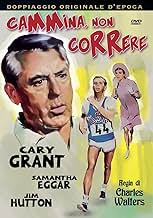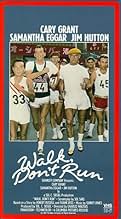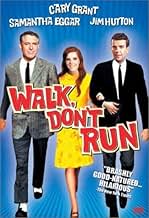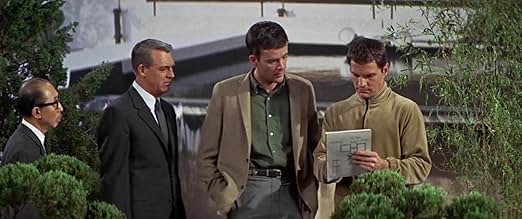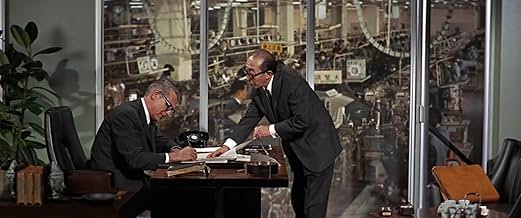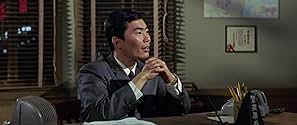IMDb RATING
6.6/10
4.9K
YOUR RATING
During the housing shortage of the Summer Olympic Games in 1964, two men and a woman share a small apartment in Tokyo, and the older man soon starts playing Cupid to the younger pair.During the housing shortage of the Summer Olympic Games in 1964, two men and a woman share a small apartment in Tokyo, and the older man soon starts playing Cupid to the younger pair.During the housing shortage of the Summer Olympic Games in 1964, two men and a woman share a small apartment in Tokyo, and the older man soon starts playing Cupid to the younger pair.
Holger Abro
- Swedish Athlete
- (uncredited)
Isabel Boniface
- Mexican Athlete
- (uncredited)
Vickey Cason
- Contortionist
- (uncredited)
David Draper
- Swedish Athlete
- (uncredited)
Terry Farnsworth
- Olympic walker
- (uncredited)
Sonja Haney
- Swedish Athlete
- (uncredited)
Sonya Harrison
- American Athlete
- (uncredited)
Featured reviews
I saw this again on TV the other night, and the sad fact is that it's a very dated, formula-driven 1960s comedy that would deservedly be forgotten except for three things:
1) If you're interested in the Olympics, it offers one of the few looks at Tokyo during the 1964 games. I'm not sure if any other films use the Tokyo games as a setting. Also, it offers a glimpse at 1960s Tokyo, which apparently no longer exists.
2) He was old and graying and his material was awful, but in many ways, this film displays the magic of the great Cary Grant. He rose above lame material one more time, and without him, this would have been unwatchable.
3) I will never forget the closing line from the original TV ads for this film: "Run, don't walk to see 'Walk, Don't Run.' " They don't make them like that anymore.
1) If you're interested in the Olympics, it offers one of the few looks at Tokyo during the 1964 games. I'm not sure if any other films use the Tokyo games as a setting. Also, it offers a glimpse at 1960s Tokyo, which apparently no longer exists.
2) He was old and graying and his material was awful, but in many ways, this film displays the magic of the great Cary Grant. He rose above lame material one more time, and without him, this would have been unwatchable.
3) I will never forget the closing line from the original TV ads for this film: "Run, don't walk to see 'Walk, Don't Run.' " They don't make them like that anymore.
I have always loved this movie. It was a typical light, romantic comedy that Cary Grant was renown for and it was a perfect vehicle for him to transition to the older man supporting role. It used all his talents for keeping it light, witty and intelligent without it being slapstick. I was sad to realize it was Grant's last movie as he could have had another ten or twenty years playing such roles. It was our loss.
I also like others in the cast despite others criticisms. Eggar and Hutton had just the right amount of chemistry. Setting it during the Tokyo Olympics made it contemporary for the times. And unlike many other 60's movies this one does not date itself all that much.
I also like others in the cast despite others criticisms. Eggar and Hutton had just the right amount of chemistry. Setting it during the Tokyo Olympics made it contemporary for the times. And unlike many other 60's movies this one does not date itself all that much.
This film was probably launched as a "Cary Grant" vehicle, a remake of "The More the Merrier", but I suggest it is a major comedy for several other reasons. As William Rutland, peer and genial businessman and busybody, Grant is mature and good; but involving him in the housing shortage in Tokyo during the 1964 Olympics was a stroke of near-genius. Adding in the old storyline about a girl planning to marry for money and introducing the right man for her instead, in the persons of Samantha Egggar and Jim Hutton, was better, with Grant acting as matchmaker. But making Hutton a member of the US Olympic team and keeping his event a secret, adding in a comedic Russian spy, the smallness of their shared apartment which Grant sublets to Hutton after wangling his own way in, plus visiting a Japanese household of friend Miiko Taka with Eggar and fiancée John Standing, he of the "tall forehead" and boring personality, was I claim pure gold comedically speaking. Charles Walters directed this satirical comedy in breezy style, with story by Robert Russell and Frank Ross from Sol Saks' and Grason Kanin's inspired story. The cast included besides the principals George Takei as a Tokyo police officer, Ben Astar as Dimitri the bumbling Russian spy, skilled actor Teru Shimada as Taka's father, Lois Kiuchi as her mother, Ted Hartley as Yuri, Hutton's Russian fellow athlete-friend, and hundreds of others in bit parts and small roles. The very genial music for the film by Quincy Jones was low-key and delightful; Henry Mancini supplied songs also; the cinematography by Harry Stradling Sr. was lovely from start to finish; and the production designs by Joseph C. Wright were varied and serviceable through. Outstanding scenes in the narrative include I suggest the way in which Sir William's trousers keep disappearing, the attempt by Grant in underwear to enter the Olympic walking event to obtain a signature on a document from Hutton, the party where Grant suggest to a lady Russian shot putter that she put her derrière somewhere else than in his dinner, the trip to see Eggar's friends (the Kurawa family) and the police station scene, among others. This is a sometimes slick and always amusing and I find frequently very-involving story filled with characters that seem unusually real. It may have begun as a Cary Grant vehicle; but I find Hutton is brilliant, and it became despite a bit of over- lengthy presentation a classic as a romance, a comedy concerning overcrowding and a presentation of very memorable characters whose general theme is how one need to deal with life by means of honesty rather than by taking the seemingly easiest path. A favorite of many, many filmgoers, myself included.
I'm sure that Cary Grant was dangled the prospect of a nice all expenses paid for location shooting in Tokyo for his final film, Walk Don't Run. It's the reason he did the film I'm sure.
It's not a bad film to go out on, not near as good as say The Shootist was for John Wayne, but no Cuban Rebel Girl like Errol Flynn had. It's a remake of an earlier Columbia Pictures hit, The More the Merrier that starred Joel McCrea, Jean Arthur, and Charles Coburn. Coburn got a best supporting Actor Oscar for his performance and Grant has his part.
The original film dealt with a tremendous housing shortage in Washington, DC during the World War II, a crisis of four year duration as opposed to a few weeks in Tokyo where because of the Olympics of 1964 there are no hotel rooms to be had.
On a whim, visiting industrialist Cary Grant answers an ad for a room mate posted at the British Embassy by Samantha Eggar. She gets the full court Cary Grant charm and after a bit of reluctance, allows him to stay. Then Grant lends half of his half to American Olympic athlete Jim Hutton.
Eggar has a fiancé, but foxy Cary works his wiles on both Samantha and Jim. The results are obvious.
Walk Don't Run has a few funny moments, Cary Grant style, especially when Grant strips down to his underwear to talk to Hutton during Hutton's event which is the long distance walk. He also has to pry Eggar's fiancé away to get Eggar and Hutton together. John Standing is Eggar's fiancé and he puts in a droll performance as a dull predictable British civil servant.
Cary managed to mine a few more laughs out of his last screen role, but you decide if the trip was worth it.
It's not a bad film to go out on, not near as good as say The Shootist was for John Wayne, but no Cuban Rebel Girl like Errol Flynn had. It's a remake of an earlier Columbia Pictures hit, The More the Merrier that starred Joel McCrea, Jean Arthur, and Charles Coburn. Coburn got a best supporting Actor Oscar for his performance and Grant has his part.
The original film dealt with a tremendous housing shortage in Washington, DC during the World War II, a crisis of four year duration as opposed to a few weeks in Tokyo where because of the Olympics of 1964 there are no hotel rooms to be had.
On a whim, visiting industrialist Cary Grant answers an ad for a room mate posted at the British Embassy by Samantha Eggar. She gets the full court Cary Grant charm and after a bit of reluctance, allows him to stay. Then Grant lends half of his half to American Olympic athlete Jim Hutton.
Eggar has a fiancé, but foxy Cary works his wiles on both Samantha and Jim. The results are obvious.
Walk Don't Run has a few funny moments, Cary Grant style, especially when Grant strips down to his underwear to talk to Hutton during Hutton's event which is the long distance walk. He also has to pry Eggar's fiancé away to get Eggar and Hutton together. John Standing is Eggar's fiancé and he puts in a droll performance as a dull predictable British civil servant.
Cary managed to mine a few more laughs out of his last screen role, but you decide if the trip was worth it.
It was on TV during lockdown, nothing else on, and I was busy pottering around but got quickly drawn in.
There are some absolutely masterful moments, tiny details in the acting and scripting that are reminiscent of a bygone age of film in which love honesty kindness and trust were still understood.
The acting is superb throughout and they all have immense timing and patience to make it even funnier.
An unexpected joy.
Did you know
- TriviaCary Grant (Sir William Rutland) retired from acting after this movie because, at sixty-one, he had become too old to play the romantic lead. Grant, furthermore, did not think his fans would want to see him playing supporting roles.
- GoofsAt the race, Julius says the fastest time for the 50 km race-walk is "four hours and fifty-three minutes." At the time of the 1964 Olympics, the men's 50 km race-walk world record was actually 4:00:50. (At the time of the film's release, the record was 3:55:36.)
- Quotes
Christine Easton: After 7:45, you can have the bathroom all day if you'd like.
Sir William Rutland: I wouldn't know what to do in the bathroom all day!
- ConnectionsFeatured in American Masters: Cary Grant, gentleman acteur (2004)
- SoundtracksAn Affair to Remember (Our Love Affair)
(uncredited)
Music by Harry Warren
Lyrics by Harold Adamson and Leo McCarey
Sung by Cary Grant
- How long is Walk Don't Run?Powered by Alexa
Details
Box office
- Gross US & Canada
- $9,810,000
- Runtime
- 1h 54m(114 min)
- Sound mix
- Aspect ratio
- 2.35 : 1
Contribute to this page
Suggest an edit or add missing content



